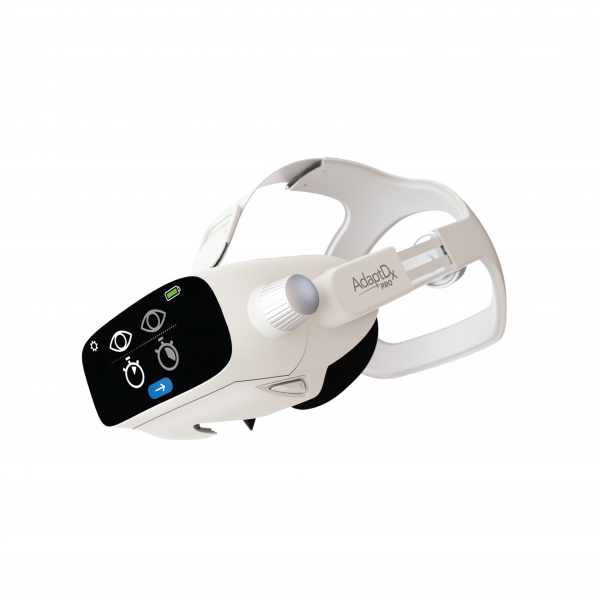Small Town Practice, Big City Care
As an optometrist in a rural area, I take care of
many patients who will never see another eye care
professional in their lifetime — my practice is one
of the only options for miles around.
I take this responsibility very seriously and treat every patient like my own family. I want to know that when my journey as an eye care professional ends, I can look back and know that I made a difference – that I detected something early and was able to stop the problem in its tracks, or that I improved the outcome for my patient. I want to know that I did everything I possibly could.
I see a lot of disease in my practice, and knowing the prevalence of age-related macular degeneration (AMD) made me scratch my head and question, am I missing AMD in my patients? This nagging fear led me to acquire an AdaptDx® tabletop dark adaptometer to help me detect and monitor this chronic disease.
When I introduced this technology, my staff understood my “why” – they knew it was important to detect AMD as early as possible, and we were all on the same page about the need to test our at-risk patients. Still, the original AdaptDx device came with challenges. It was difficult to figure out where to fit the test into our practice flow, and the device itself was tricky for both staff and patients. We managed approximately 100 tests a year in 2018 and 2019, working with the tabletop device.

"We knew that early detection was important; we just needed to find a way to offer this important test to the right patients." - Dr. Francis Bynum
Dark adaptation was a game-changer for my practice – we were finding AMD and helping patients monitor it – but when the AdaptDx Pro® came along, it changed the game even more. We knew that early detection was important; we just needed to find a way to offer this important test to the right patients. Because this device was easier to use, we created a screening package that includes an AdaptDx Pro Rapid Test with Optomap retinal imaging and began offering it to every patient over 40.
“When you reach a certain age, you should get an annual colonoscopy or mammogram, etc. I wanted to condition my patients over 40: when you reach this age, we need to test your dark adaptation speed to look for signs of AMD.”
I presented this new plan to my staff during an office meeting. As the only optometrist, I may be the quarterback of my practice, but if I don’t have anyone to pass the ball to, it isn’t going to work. My staff needed to be on board with the plan to offer testing to every patient over 40. To help patients understand why they should be tested, we started to use analogies, comparing the AdaptDx Pro Rapid Test to other health screenings. For instance, when you reach a certain age, you should get an annual colonoscopy or mammogram, etc. I wanted to condition my patients over 40: when you reach this age, we need to test your dark adaptation speed to look for signs of AMD.
Part of implementation included educating staff on the right questions to ask so patients understand the value of these tests. My technicians are well trained to ask about family history, hypertension, diabetes and high cholesterol. Sometimes, if a patient tells my technician that they don’t want the dark adaptation test, I’ll sit with them in the exam room and talk them through my reasoning. Once we talk, 9 out of 10 patients agree to be tested, because they see how important this is.
In my office, this isn’t a sales pitch – we want to make sure our patients are healthy. If they do have AMD, we want to catch it early. But it really is phenomenal when we can assure people, Congratulations! You have no signs of macular degeneration. When a patient fails the Rapid Test, we can discuss the findings and next steps, such as implementing nutraceuticals or taking steps to lower their cholesterol.
Oftentimes there’s a mindset that only big practices can afford fancy equipment – but when you practice in a rural area, you may be the only option that your patients have. No one should go blind from AMD because they live in an area where the right technology isn’t available. Technology isn’t just for a big city – technology is for everybody. When we come together as a team and invest in our practice, we’re investing in our patients.
Read More Success Stories
Read more about how fellow colleagues utilize AdaptDx® technology to help improve AMD patient outcomes and their practices.
Contact Our Sales Team
As the AMD Experts®, our sales team is here to answer your questions about the clinical and financial benefits of the AdaptDx Pro®.

